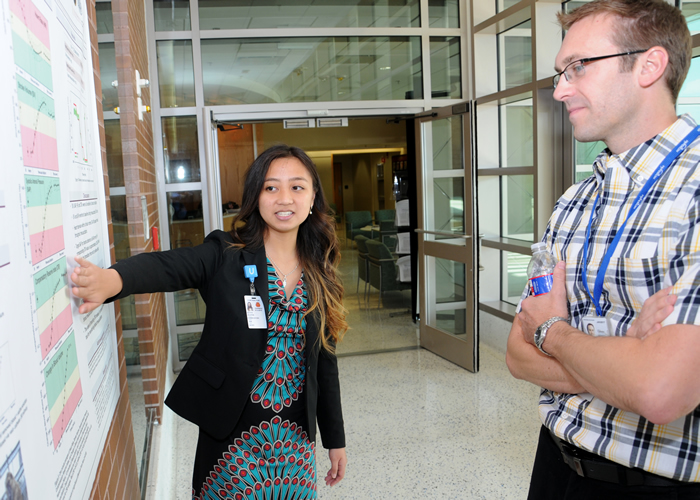College interns complete summer internship program at USAISR

After a 10-week summer internship at the U.S. Army Institute of Surgical Research at Fort Sam Houston, Texas, a group of undergraduate college students wrapped up their research with a poster presentation for the USAISR staff to highlight their work.
At the beginning of summer, the 11 interns, which were sponsored by the Oak Ridge Institute for Science and Education, were paired with USAISR researchers who served as mentors to oversee their work on combat casualty care research projects.
"Overall, the poster session was a tremendous success," said USAISR Director of Research Lt. Col. (Dr.) Kevin Chung. "It gave the students an opportunity to put what they learned this summer on full display. I was very impressed with what they were able to accomplish during their short time with us. Many of their projects will have an immediate and relevant impact in helping shape combat casualty care."
David M. Burmeister, Ph.D., USAISR combat casualty care research scientist and lead intern mentor, said that the ORISE program exposes students to a laboratory environment and provides them with invaluable research experience.
"This program also helps students to clarify their educational goals and enables them to reach those goals," added Burmeister.
The interns' time at the USAISR was more than learning about and conducting research. The interns attended weekly seminars, led journal club sessions, and attended Burn Center Intensive Care Unit rounds with the unit staff.
University of California, Los Angeles, student Betty Nguyen was one of the interns assigned to work with research physiologists Carmen Hinojosa-Laborde, Ph.D., Vic Convertino, Ph.D., USAISR senior scientist, and Lt. Col. Robert Carter at the Tactical Combat Casualty Care task area.
Nguyen performed data analysis from data gathered using the Compensatory Reserve Index. The CRI uses an algorithm designed to take information from a patient's finger pulse oximeter and gauge whether immediate medical attention is needed ' even if the patient seems alert and responsive. It is the first device of its kind that can truly detect when a patient seems stable but is actually getting dangerously worse, known as "crashing."
"It was a great experience, and I learned a lot of relevant knowledge that will help me with my college studies," Nguyen said. "I learned the most from shadowing and watching some influential clinicians and researchers in their work environment."
Nguyen learned about the internship program during a presentation provided by Carter at UCLA. Carter and Nguyen are both Gates Millennium Scholars, a scholarship funded by the Bill and Melinda Gates Foundation.
"This summer experience has made me more confident about my abilities and has strengthened my interest in pursuing a medical and public health dual degree," said Nguyen. "I'll always remember the friendships made here as well as the many Texas adventures I had as I return to California with a newfound love for country music and Texas barbeque."
 An official website of the United States government
An official website of the United States government
 ) or https:// means you've safely connected to the .mil website. Share sensitive information only on official, secure websites.
) or https:// means you've safely connected to the .mil website. Share sensitive information only on official, secure websites.


